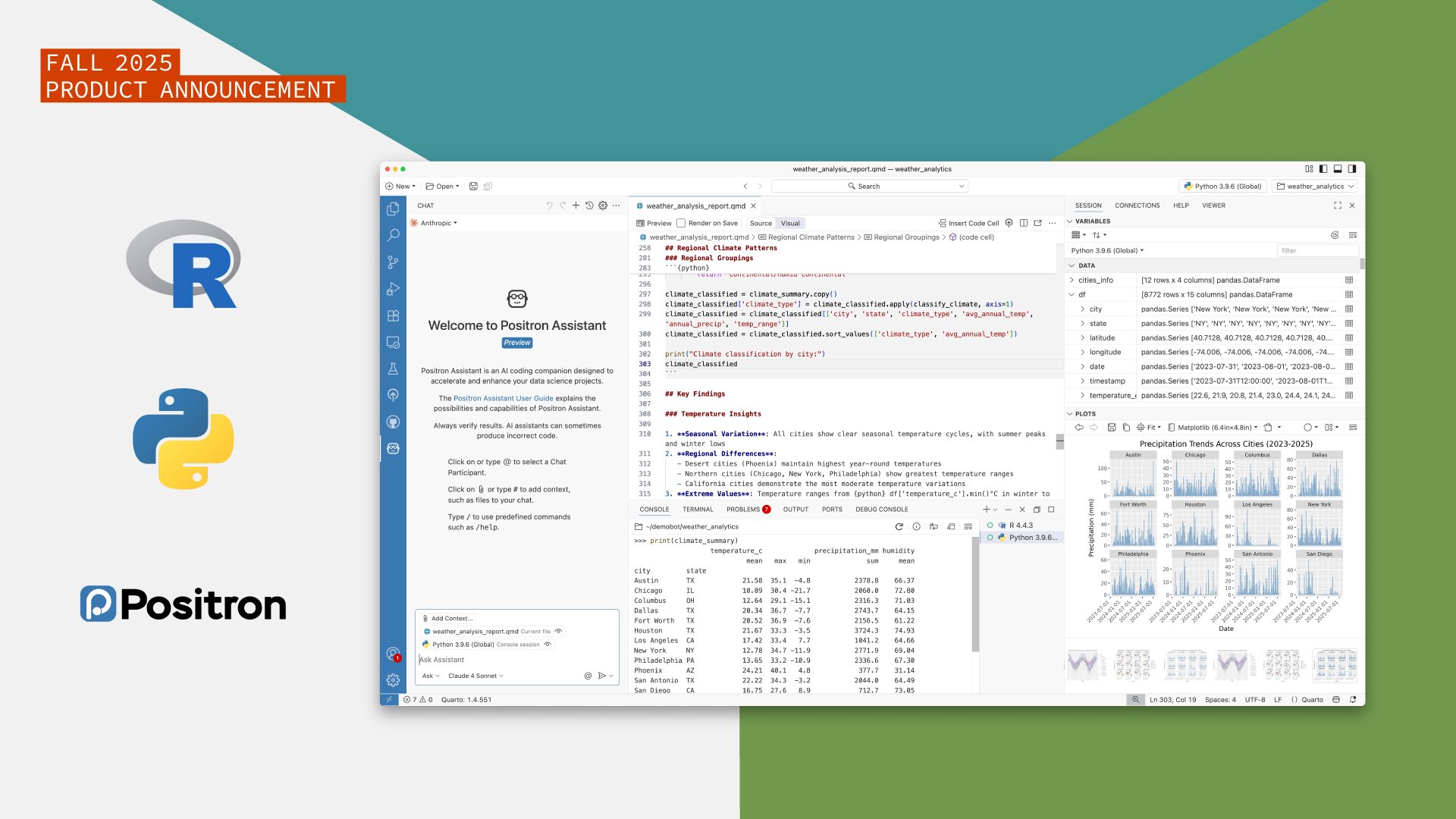Announcing Positron, a new Data Science IDE

We are excited to introduce Positron, a free, next-generation Integrated Development Environment (IDE) for data science by Posit PBC. Positron brings the spectrum of exploration and production work together in one environment so you can move from ideation to insight to application without switching context. Ultimately, we have taken all the learnings from the 14+ years of building RStudio, and applied them to a new platform that treats Python and R as equals.
It is a great time to start using Positron, as we’ve now released our second Positron desktop stable release as of 2025.08.0 after 2+ years of development. The upcoming release of Posit Workbench will also introduce Positron sessions as a generally available IDE type.
If you are wondering about RStudio, please don’t worry – it’s not going away! RStudio includes 14+ years of R focused optimizations and we are committed to maintaining and updating RStudio. For more information, please read the FAQ for RStudio users.
Why Positron and why now?
When RStudio, PBC became Posit, PBC in 2022, we committed to supporting multi‑language, open‑source data science. This has included introducing Quarto, Shiny for Python in addition to R, and broad support for both Python and R in our open-source packages and Posit Team suite of professional tools. Today, data teams work in both R and Python, often within the same group and sometimes even within the same project.
Positron is designed for that world, and ultimately, our goal for Positron is to create an IDE for data science that supports the full scope of modern scientific and data-driven work, across languages, tools, and workflows. We aim to do this by:
- Providing a cohesive and thoughtful experience for writing code, performing analyses, and exploring data. Whether you’re working in Python, R, or both, Positron combines notebooks, scripts, and consoles with native support for plotting and data output. Positron is also built to support additional languages, such as SQL, in the future.
- Supporting the kinds of workflows that are central to data science. This includes iterative development, rich interactive output, and publication-quality documents. Positron provides built-in support for notebooks, Quarto, data apps, and more, enabling a range of common authoring and analysis tasks.
- Offering a modern, extensible editor built on open standards. Positron is built on Code OSS, the same foundation as Visual Studio Code, with custom features and UI elements designed specifically for data science. This includes support for a wide array of VSIX extensions and customization, while also enabling deeper integration of language-specific tools.
We believe that powerful, user-friendly, and open tools are essential for scientific computing. Positron is freely available, aligning with our goal to make high-quality data science tools accessible to everyone.
Key Features
- Variable & Data Frame Explorer: Inspect variables and explore data frames with interactive filtering, sorting, and summary statistics.
- Multi-Session Console: Run Python or R code line-by-line or chunk-by-chunk in one or more consoles without needing to modify your source files.
- Notebook Support: Work with R and Python notebooks alongside your functions, modules, and scripts in a single workspace.
- Positron Assistant: (Public preview) is our native GenAI client that takes the core AI assistant experience you expect and adds in all the context needed so models can understand your session, variables, and plots. It can answer questions, suggest completions, and help debug execution errors in context, all backed by the best-in-class models from Anthropic (and other model providers in the future).
- Plot Pane: Review, resize, and export your past visualizations easily.
- Integrated Data App Workflow: Launch and debug Data Apps or APIs like Shiny, Streamlit, or Dash, and FastAPI directly with the Run App button.
- Database Connection Pane: Browse and query local or remote SQL data sources within the IDE.
- Push-Button Deployment: Deploy scripts, reports, data apps, or APIs to Posit Connect with one click or with git-backed workflows.
- Interpreter Management: Switch easily between R and Python environments in your workspace.
- Extension Support: Customize your workflow with thousands of VS Code-compatible extensions supplied by the open-source extension marketplace Open VSX.
- Project Folder Templates: Start new Python or R projects with ready-made templates and environment setup via tools like uv and renv.
Learning more
Positron desktop is free and available today for Windows, macOS, and Linux under the Elastic License 2.0, a source-available license. Read more about what this license means and our decision to use it.
- Download Positron desktop for free and try out our Quick Start guides
- Watch the Quick Tour video for an overview of the core features
- Follow the migration guides from VS Code or RStudio
- Join the community on GitHub or open a discussion to share feedback and ideas
- Join us in person or virtually at posit::conf(2025) to hear more about Positron!
- Subscribe to the Posit Blog for even more announcements and content
- Read the FAQ for common questions
Positron is the next step in our effort to make data science and scientific computing more seamless and collaborative. We hope it helps you make an even bigger impact with data.
– The Positron Team